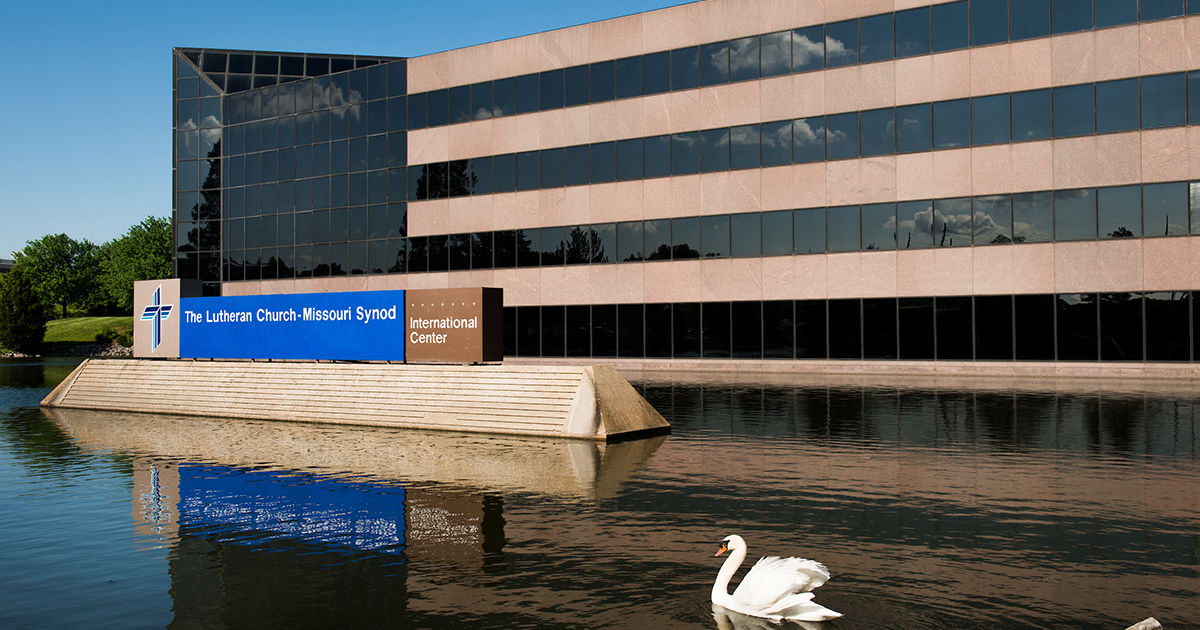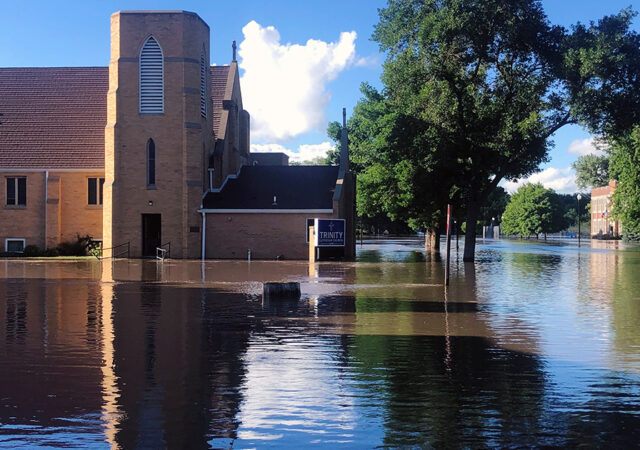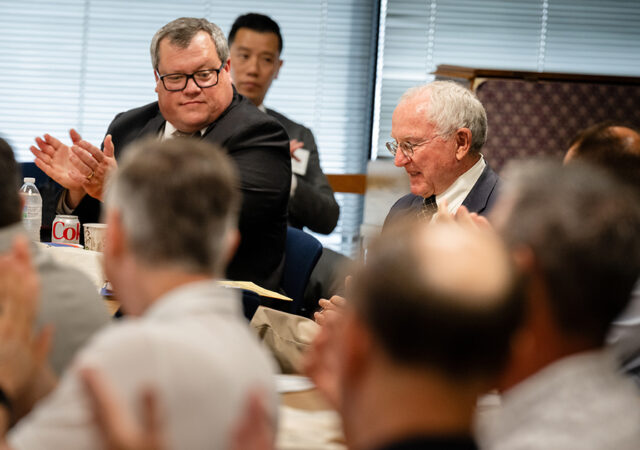
By David Strand
Though no single subject stood out as dominant, The Lutheran Church—Missouri Synod (LCMS) Board of Directors (BOD) nonetheless packed a lot of business into its Nov. 19 Zoom meeting. Several agenda items, not surprisingly, were influenced by the ongoing COVID-19 pandemic.
President’s report
Calling today’s climate — dating back nine or 10 months — “exceedingly challenging for the church,” Synod President Rev. Dr. Matthew C. Harrison covered an array of topics in his report. Highlights included:
- Praise for the Office of the Secretary and Department of Rosters, Statistics and Research Services for their “wonderful survey” of LCMS church and school workers during these times of COVID-19. “It’s an insightful study on the major effects the virus has had on our congregations and people.”
- An update on district visitations by the Office of the President (OTP) in the current triennium. Nine of the 35 visits have been completed, whether in person or virtually.
- A status report on the renewed search for a president by Concordia Seminary, St. Louis. Both that school and Concordia Theological Seminary in Fort Wayne, Harrison said, are seeing increases in enrollment.
- Plans for a Dec. 1 meeting, an ecumenical conversation, with leaders of the Wisconsin Evangelical Lutheran Synod and the Evangelical Lutheran Synod.
- An update on a project by the Commission on Theology and Church Relations to develop an annotated and expanded version of the Large Catechism for subsequent general publication.
Harrison, who had been meeting with the Synod’s Council of Presidents (COP) in another Zoom meeting during the week, reported that the COP had voted unanimously to encourage him to ask the Synod’s congregations to vote on whether to postpone the Synod convention by one year, thereby allowing an extra year for districts to hold their conventions. Complications with, and possible restrictions on, large groups meeting in person are making some of the upcoming as-scheduled conventions untenable.
In the event the postponements happen, the current triennium, in effect, would be “stretched” to include a fourth year. Most elected and appointed officials would see their terms extended by a year.
As part of the process for considering this question, the president is required to consult with the BOD, which he did at this meeting. Some on the BOD favored a wait-and-see approach. “A lot can happen,” said Chairman Rev. Dr. Michael L. Kumm, “including the availability of a vaccine, between now and the late spring and early summer of ’21,” when most of the district conventions are scheduled.
‘Good news’ from Plans
The lengthiest presentation of the day, nearly 90 minutes, featured James Sanft, president and chief executive officer of Concordia Plan Services (CPS), and CPS Board Chairman James Jaacks.
Despite what he called “the imperfect storm” of 2020 — COVID-driven market volatility, the demographic challenges of retaining and growing the number of Plan members, the possibility of increased regulation under a different White House administration, and the unlikelihood of the Supreme Court overturning the Affordable Care Act — Sanft said that Concordia Health Plan (CHP) rate increases for ministries on Jan. 1, 2021, will be “lower than expected.”
He and Jaacks gave an overview of the CHP and Concordia Disability and Survivor Plan and did a “deeper dive” into the Concordia Retirement Plan (CRP). They also summarized the “Plan Level Investment Performance,” relative to benchmarks, over the past one-, three-, five-, seven- and 10-year periods.
Sanft, noting that lay workers are the “economic engine” of the CRP (two-thirds of Plan members are lay), is a “big believer” in the current state and future growth of Lutheran schools, where the great preponderance of teachers, administrators and other personnel are laypeople. He also cited the desirability of bringing more Recognized Service Organization workers into the Plans.
“We added 2,500 new employees from LCMS ministries in the past year,” he said, “and this in the face of COVID. That’s good news.”
“We face significant headwinds,” said Jaacks, harkening back to Sanft’s “imperfect storm.” “But CPS is blessed with a strong team — staff, board, consultants and advisors. COVID has created opportunities for CPS to serve the LCMS in new ways. Our ministries and workers need us to build off our 2020 momentum.”
‘Ahead of budget’
Turning to Synod finances, “We’re doing pretty well,” said Ross Stroh, executive director of LCMS Accounting.
Though the LCMS expense budget is 16% lower than last year’s, ministries are managing to stay in the black by traveling much less (a result of COVID-19) and closely controlling expenditures with an aim toward fiscal austerity. Taken together, Stroh said, “the Offices of National and International Mission are ahead of budget by nearly $800,000, while the OTP,
COP, Church Relations and Legal collectively are ahead almost $200,000.”
Nonetheless, he continued, given the ongoing uncertainties of future revenues owing to the pandemic, challenges loom, such as the Synod’s negative net-asset position in terms of undesignated funds.
While budgets have been successively trimmed, and unrestricted gifts from individual donors are on the rise, the so-called accumulated undesignated net-asset deficit continues to require the Board’s attention.
Another concern related to undesignated funds, according to Brown Smith Wallace (BSW), the Synod’s outside auditor, is that “district revenue performance continues to drop each year. We’re looking at a bad, five-year trend” in district remittances to the Synod, one of the auditors told the Board. “This has a big effect on, and tightens, your operating budget.”
In its report on the consolidated financial statements of the LCMS, the Lutheran Center for Religious Liberty, Lutheran Holdings, and the no-longer-operational Lutheran National Housing Support Corporation, BSW found “no audit adjustments or material weaknesses.” The firm praised LCMS Internal Audit and said, “We have no difficulties with your skilled, experienced and knowledgeable management team.”
New CUS model
The board received an update from BOD member Christian Preus, chairman of the Res. 7-03 Task Force, which was created and charged by the 2019 convention to work with the Synod president and LCMS higher-education leaders in devising a new governance model for the Concordia University System (CUS).
“While some differences of opinion remain,” said Preus, “the overall approach of the task force has been fairly well accepted by the various groups.”
Preus said the new model would eliminate the CUS as a separate Synod corporation and replace it with a Commission on University Education, which would focus on such “kingdom of the right” responsibilities as theological accreditation, church-worker preparation, campus life and the strengthening of the schools’ confessional Lutheran identity.
Meanwhile, in the “kingdom of the left,” the regents and administrators of the schools would be fully responsible for finances, operations, property, legal, academic programs and collaboration among the institutions.
A financial analysis, Preus said, shows that LCMS, Inc., has made “the substantial commitment of more than $90 million over the past 15 years” to CUS colleges and universities, mainly in the form of subsidies and, more recently, in providing loans or paying off debts. “This would not continue under the new model,” he said.
In other business, the Board:
- Heard reports from its Governance, Personnel and Audit committees. Two “action items” stemming from Personnel were the election of the Rev. William F. Zwick to the Board for International Mission and Daryl Dagit to the Board of Trustees — Concordia Plans/Board of Directors — CPS. More information on these reports, along with further details on other matters, can be found in the “pending minutes” on the BOD’s website.
- Delayed until its February meeting any action concerning the possible reallocation of Board-designated funds.
The BOD next meets on Feb. 19, 2021.
Posted Jan. 8, 2021






Good to see the increase in enrollment at the seminaries. Now let’s see an increase in membership.